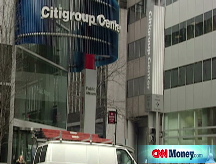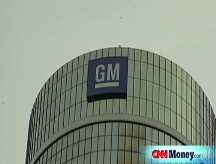Throw Citi and BofA out of the Dow!
Each bank is bleeding red ink and has received bigger bailouts than their peers. It's time to replace them with firms that don't need to be on the government dole.
NEW YORK (CNNMoney.com) -- There used to be a time when investors didn't have to worry about the financial health of companies in the Dow Jones industrial average.
If a company was one of the 30 considered to be an important barometer of the U.S. economy, you'd think that it would have to be a relatively stable firm.
Sure, the company would go through some cyclical ups and downs like any other firm. But you wouldn't have to worry about it going belly-up without assistance from the government.
That's clearly no longer the case. In September, I wrote about why AIG had to be booted from the Dow a couple of days before the Federal Reserve bought a majority stake in the struggling insurance giant and the folks at Dow Jones Indexes made the decision to remove it from the Dow.
And I also recently argued that General Motors (GM, Fortune 500), which had to get a $13.4 billion loan from the federal government last month to avoid bankruptcy, should be kicked out of the Dow.
Sadly, these Kick a Company from the Dow columns are almost becoming like my own personal Mad Libs in this rotten economy.
Here is why (corporate name) needs to be removed from the Dow. Shares of the (adjective) company have (verb: past tense) over the past few months, and the company is expected to suffer massive losses for the next (number) quarters.
And today, you get two for the price of one!
Now that Citigroup (C, Fortune 500) appears to be shrinking itself from a "financial supermarket" to a "financial convenience store," and Bank of America (BAC, Fortune 500) is receiving another $20 billion from Treasury Secretary Henry Paulson to ensure that Merrill Lynch doesn't torpedo the firm's balance sheet, I'm not sure that either is worthy of being included in the Dow anymore.
First things first. I realize that the Dow is not a mutual fund. The editors at The Wall Street Journal and other members at Dow Jones Indexes that decide who's in and out at the Dow should not be getting rid of stocks just because they've fallen and replace them with hot momentum stocks.
And if you keep reading, you'll see that some of the stocks I suggest as replacements have hardly been setting the market on fire as of late.
That being said, the Dow shouldn't be a collection of companies that are at risk of collapse without having to tap the First National Bank of Hank.
John Prestbo, editor and executive director of Dow Jones Indexes, told me Friday that no action was being planned regarding BofA or Citi right now.
But when I spoke with Prestbo in November about GM, he said the reason AIG was removed was because the government essentially nationalized it.
He added though that he thought there was a difference between what the Federal Reserve did with AIG and what Treasury was doing with banks as part of the Troubled Asset Relief program, or TARP.
So even though some might argue that Citi and BofA have been quasi-nationalized now that the government has bought $45 billion in the company's preferred stock, this still does not make the government anywhere close to being a majority owner of either bank.
Prestbo elaborated on that point Friday.
"Neither bank has the government owning common equity, and there is no control of the company by the government," he said. "At AIG, the government may not be calling all the shots but they are definitely helping to run the show."
However, Prestbo said that another litmus test for whether a company should be kicked out of the Dow is whether it operating on a level playing field with competitors. So for example, if a Dow component filed for bankruptcy, Prestbo said there would be no choice but to remove it.
"What we try to do is make sure every company in the Dow is operating under the same kind of marketplace," he said.
While Citi and BofA haven't gone bankrupt, it is harder by the day to argue that they are "operating in the same kind of marketplace" as other banks. They have not only both received more TARP funding than peers, but also have been given guarantees against hundreds of billions of dollars of potential losses as part of their bailouts.
So unless the Fed, Treasury and FDIC are willing to officially announce that they will backstop the losses on mortgage-backed securities for all banks, it looks like Citi and BofA have an unfair advantage over its rivals.
And Prestbo conceded Friday that this is a concern.
"It's possible that even though the government may not take a direct equity stake, its involvement with the banks could disqualify companies from the standpoint of business as usual type competition," he said.
Finally, Prestbo hinted that a bigger issue for Citi in particular is that the bank announced Friday it is reorganizing into two units. That could set the stage for Citi to sell off businesses and become a shell of the company currently in the Dow.
"Companies do change their stripes over time. That's one thing we try and keep an eye on. We selected Citigroup, Bank of America and JPMorgan Chase as leading representatives of the financial industry. If they become less than leading, they become vulnerable," he said.
With this in mind, who could replace Citi and BofA if they are both shown the door? (For now, I'll give up on the notion that GM will be booted anytime soon for a foreign automaker like Toyota.)
Getting rid of these two would mean that there are only two financials left in the Dow: JPMorgan Chase and American Express. So it's likely that at one replacement should be another financial firm.
I'd suggest Wells Fargo (WFC, Fortune 500). Sure, its stock has also taken a huge beating in the past few weeks, plunging 37.5% just this year alone. Wells also is a recipient of $25 billion in TARP funds, and it is taking a huge risk with its Wachovia acquisition.
But many industry experts believe that Wells and JPMorgan Chase (JPM, Fortune 500), which also got $25 billion, were not happy about getting this money because neither bank felt they had to be lumped in with Citi and BofA as banks requiring assistance.
Wells has also won plaudits from analysts for its conservative management during the housing boom, and its savvy in absorbing other big mergers. Wells, after all, is the product of a merger with Norwest.
You'd be hard-pressed to find another big financial firm that's worthy of inclusion in the Dow though. So I doubt that two banks would be added.
Pepsico (PEP, Fortune 500) would be a perfect addition. It's one of the better-managed companies in any industry and has the type of global brand recognition that the people at the Dow usually look for.
However, it's probably not a likely addition anytime soon given that another consumer staples company, food giant Kraft (KFT, Fortune 500), was the last new Dow arrival, replacing AIG in September. Plus, Pepsi's top rival Coca-Cola (KO, Fortune 500) is already in the Dow.
So it's probably more plausible to think that if there are two Dow vacancies anytime soon, either another tech firm, energy company or health care firm will join Wells Fargo.
There are currently only two energy companies in the Dow, which makes an addition from that sector the most probable.
Petroleum exploration firm ConocoPhillips (COP, Fortune 500) or oil services company Schlumberger (SLB) would fit the bill. Energy is still a vital sector of the U.S. economy and it's somewhat odd that there are only two companies from it in the Dow currently, even though plunging oil prices have led to big drops in each stock lately.
In the tech sector, networking equipment leader Cisco Systems (CSCO, Fortune 500) is a logical candidate for the Dow. The company has a market value of nearly $100 billion, and despite a slowdown in demand for products using the company's switches and routers during the recession, Cisco is still well-positioned to benefit from the continued build out of communications networks around the globe.
Finally, health care has emerged as one of the more stable sectors of the economy during this downturn. And there are only three healthcare stocks in the Dow. Of that group, two are Big Pharma firms. So why not add biotech leader Amgen (AMGN, Fortune 500) or device maker Medtronic (MDT, Fortune 500)?
Again, I'm not suggesting that the Dow get routinely overhauled like some actively managed hedge fund so that it can increase in value. But it would be nice to have more industry leaders in it and fewer companies forced to go begging to Washington for lifelines. ![]()




